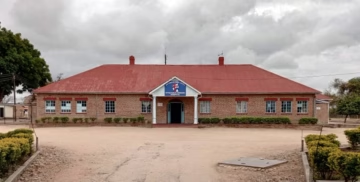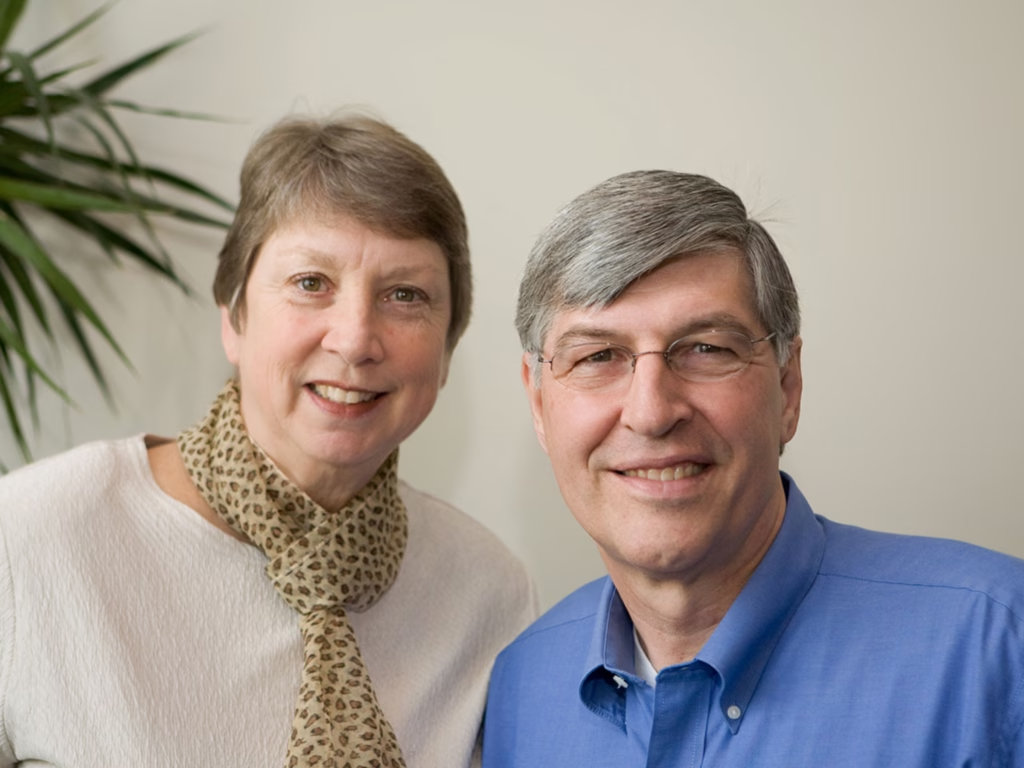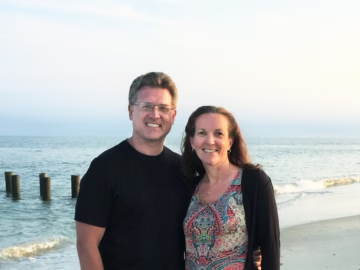
On behalf of the BIC U.S. family, we want to express our deepest gratitude for Dr. John and Esther Spurrier’s nearly three decades of faithful service overseas. This December, John and Esther will be retiring from full-time medical missions at Macha Mission Hospital in Zambia, following a groundbreaking career in medicine and ministry.
Calling to Zambia
What started as a two-year commitment in Zambia became a lifelong calling for John and Esther Spurrier.
Following John graduating medical school, John and Esther — who had met at Messiah College — decided they wanted to complete a term of voluntary service. Many of their friends had done alternative civilian service during the Vietnam War, while John, in medical school, had received educational deferment from the military draft. The draft ended, but the Spurriers still desired to serve, specifically at the BIC Navajo Mission Hospital in New Mexico.
When the opportunity fell through, the Brethren in Christ missions board asked them to consider serving in Africa:
“We don’t think so!” they immediately responded. But, after prayer and discernment, they felt God leading them to serve at Macha Mission Hospital.
Committed to a Vocation
A year after arriving at Macha, the Spurriers welcomed Dr. Phil and Elaine Thuma as colleagues and fellow BIC mission workers.
At the time, the newly minted doctors were the only physicians serving at Macha Mission Hospital.
Initially, a senior missionary pulled the two couples aside, “We have never had two BIC missionary doctors working in the same hospital get along. If you can work together, it would be a miracle.”
Despite the warning, a lasting, deep friendship was forged between the two families. Each had a similar ethos toward humbly serving Macha’s population. Their connection with the community and desire to empower the Zambian medical team led to many of Macha Mission Hospital’s successful public health initiatives.
Changing Healthcare in Southern Zambia
Since arriving at Macha Mission Hospital in 1975, John — in partnership with the Macha Mission Hospital medical team — has helped transform the landscape of health in southern Zambia.
Diseases such as neonatal tetanus, leprosy, measles, trachoma, schistosomiasis, and malaria have been eradicated or greatly reduced among the 160,000 people served by Macha Mission Hospital. For example, the malaria efforts in which John partnered with Phil reduced malaria by more than 95 percent in the region.
Under John’s supervision, Macha Mission Hospital’s medical team has also addressed one of the greatest epidemics of the 20th and 21th century — AIDS. In 1986, the first diagnosis of a patient with AIDS was made at Macha Mission Hospital. By 2001, 20 percent of the Zambian population had contracted the fatal disease. Funerals occurred every week of people they knew or their families.
At the height of the AIDS crisis in Macha, John read an article discussing how to eliminate diseases through universal testing and treating all HIV-positive patients. And he wanted to initiate the method in Macha.
John recognized, though, the community needed to support the treatment program. During a meeting about this possibility with Chief Macha and 18 senior village headmen, John asked if they were willing to be tested for HIV.
Further, John asked them to disclose their results to each other.
At the time, having HIV was stigmatized and disclosing it to others shameful. But the chief stepped forward to be tested.
Everyone else followed.
“John had gained their trust,” said Elaine Thuma. “The people of Macha knew the Spurriers were people of their word, that they were there to help. As longtime missionaries, they had the right to speak because they had earned the community’s trust.”
And this trust led to dramatic results.
In 2005, Macha Mission Hospital opened an antiretroviral therapy (ART) clinic — which John facilitated — providing free treatment to those with HIV, the virus leading to AIDS. While antiretroviral drugs do not cure the disease, they greatly reduce the number of viruses in the body — enabling individuals to live normally. Since 2005, more than 11,000 HIV patients have been enrolled in the ART Clinic. Now AIDS is no longer a death sentence in the community.
And the treatment could eliminate the disease for the next generation: Beyond aiding HIV patients, antiretroviral drugs (ARVs) also help prevent patients from transmitting HIV to partners and children. For example, John and his medical team have been providing treatment to HIV-positive pregnant women. Due to the treatment with ARVs of all HIV-positive pregnant women at the Macha Mission Hospital Antenatal Clinic, not a single HIV-positive baby has been born to these mothers in the last 5 years.
Such statistics provide hope that today’s children will one day be part of an HIV-free community.
Beloved of the Community
Because of their long-term commitment to healthcare in Macha, the Spurriers have become cherished members of the Macha community. Conversant in Tonga, the regional tribal language, Esther and John participate in the local church and life of the village. And in honor of the Spurriers, Zambian parents often named their children Spurrier or even Esther.
The Spurriers were grateful to be part of the social changes that came after Zambia’s independence, changes that challenged previous practices. For example, missionary retreats at Macha had not included the Zambian staff, and no Zambian personnel lived on the hospital compound.
“John and Esther pushed for a break from that era,” said the Thumas. Integrating missionary retreats to include Zambian staff, the Spurriers also encouraged inviting the Zambian medical team to live within the hospital compound.
Esther
A licensed BIC U.S. minister, Esther was a pillar in the local community and church.
“She really will be missed, especially among the women in leadership,” said Elaine. “They call her ‘our mother.’”
Missions country representative to the Zambian BIC Church (serving in communications), Esther also offered theological education and training (Theological Education by Extension, known as TEE). She served as chairperson of the national women’s committee and was a member of the Zambian BIC national Church executive board. Esther and John were also part of founding two small groups that later became thriving churches. In recent years, Esther carried out ministry to older women.
“I’ve done many things that I loved, and I’ve enjoyed the variety,” said Esther.
In the early years of the Spurriers’ service, Esther also worked in the hospital: in the sewing room, as a bookkeeper, and as a math teacher for nursing students. She also worked as a scrub nurse — in time to help Elaine deliver twins, with John operating and Phil assisting!
Elaine shares a story demonstrating Esther’s servant leadership. Post-operation, having just delivered the twins, Elaine was immobile, stranded in her hospital bed for several days.
“Esther knew I washed my hair every day. She came to my bedside and said, ‘I came to wash your hair and give you a bath.’ I said, ‘Esther, I stink to high heaven.’ And she said kindly, ‘That’s why I’m giving you a bath.’” Until Elaine recovered, Esther continued to bathe and take care of Elaine.
“Esther sees what’s needed and does it,” said Elaine. “She was always laying down her life for others. Esther is very Christlike.”
With her gift of service, Esther championed hospitality at Macha, continually welcoming and hosting visitors, students, and short-term workers, a job often 24/7, especially when the nearest town with grocery stores and supplies was 40 miles away.
John
Chief medical officer at the hospital, John would yearly oversee 30,000 patient visits, 5,000 admissions, 2,000 newborn deliveries, and 1,200 operations. A continual learner, John tackled a variety of specialties in order to best serve his patients, including successfully treating burn victims and performing a number of different surgical procedures:
“The first cataract extraction that I did was on Mr. Muleya, who lived about 4 miles from the hospital,” said John. He had been blind for four years, unable to leave his village. Following surgery, Mr. Muleya was able to ride his bicycle to his six-week checkup.
“Nothing I have done in medicine is more exciting and fulfilling than making blind people see.”
For many years, John worked as the chair of the board of the Churches Medical Association of Zambia (CMAZ), now known as Churches Health Association of Zambia (CHAZ). John was also influential in training and advocating for Zambian doctors, nurses, and healthcare workers to serve at Macha.
“John started to have a burden to recruit young Zambian professionals,” said Phil Thuma. “He traveled to Lusaka [Zambia’s capital] and gave a sermon to Christian Zambian medical workers in training, encouraging and inviting them to work and serve in their own country.”
As a result, the number of Christian senior medical staff has gradually increased over the years. Also, a number of Zambian doctors have spent the first two or three years following their medical internships training with John at Macha, and other healthcare workers have chosen to make Macha their permanent home and place of service.
And because of their unique partnership, John and Phil, who are quite different in temperament, were able to complement one another to best serve the Zambian population. Phil said, “I had a lot of crazy ideas in the 1970s and 1980s. … John would listen to my crazy ideas and encourage me to go for them — even if it was not commonly being done or meant more work for him.”
For example, on Fridays, John would often cover all the hospital responsibilities, which enabled Phil to travel throughout the region to interview Zambians regarding their health needs. Through their partnership, they felt the pulse of the local population — which, in turn, helped them serve many Zambians’ medical needs.
Awards
In the U.S., the Spurriers have received numerous awards and acclaim for their work, including John being named finalist for the Gerson L’Chaim Prize for outstanding Christian medical missionary service from African Mission Healthcare Foundation; from Messiah College, John and Esther received the 1979 Young Alumni Achievement Award, and John was awarded the 1999 Alumni Christian Service Award.
Also, the Spurriers have influenced the life of the Brethren in Christ U.S. denomination. A gifted communicator, Esther has written numerous Brethren in Christ publications — including publishing “Living Simply,” a chapter in Focusing Our Faith: Brethren in Christ Core Values –as well as writing prayer resources and denomination newsletters during the Spurriers’ time in the United States. While in Zambia, she wrote a newsletter broadcasting the ministry of the Zambian BIC Church, the Zambia Intercom. She also was invited to present at BIC General Assembly.
Reflection on Legacy
God has repeatedly confirmed the Spurriers’ vocation. One way God has affirmed their work in Macha has been the deep joy they have experienced in their service.
“We have always loved what we do at Macha!” said John. “All along, we have felt this is where God has wanted us to express his love to people using the gifts that he has given us.”
Living in Zambia also helped knit their family together: In Zambia, most days, they would eat lunch together with their two children Rebecca and Matthew. “Macha was a safe and affirming place for our children to grow up,” they said.
They also expressed deep gratitude for the way their life in Zambia deepened their relationships with God. Esther shared a story of how God grew her faith: During their early years at Macha, there was never enough water. And one year, the rains were late, which created a water shortage. When the hospital’s borehole pump broke, the hospital administrator and his wife left for Zambia’s capital for several days to buy a new pump, leaving their children in Esther’s care.
A couple of days into taking care of the children, she began to wonder where to find water.
“We had one five-gallon bucket of muddy water,” said Esther. “So I bathed these five kids in the last muddy bucket of water, not knowing where the next water was going to come from.”
On Tuesday morning of that week, it rained. And the deluge didn’t relent for three days — filling the dam, providing water for Esther and the community, even without the borehole pump.
“It’s those stories of God’s provision [that grow our faith],” said Esther. “God is looking out for us, even though we sort of get to the end of ourselves, God will provide, and he doesn’t always provide in the way that we’re looking for, but he does provide.”
As they reflect on their many years in Zambia, they recognize the richness of God’s provision: through relationships with the Macha community; friendships with the Thumas and other medical personnel; an active and growing Zambian BIC Church; and a ministry in which they could use their gifts and talents to make a difference in the Kingdom.
On behalf of BIC U.S. World Missions and the BIC U.S. family at large: Thank you, John and Esther, for your many years of faithful service extending the Kingdom of God.


